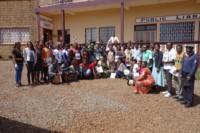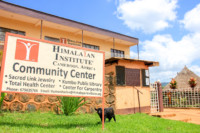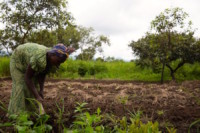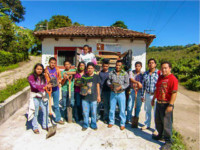With the graduation of 17 students from the first month-long intensive training program in Sustainable and Organic Agriculture, the Himalayan Institute Mexico is on the way to fulfilling its mission of creating a lasting change in the lives of farmers in the Sierra Norte. True sustainability as an organization means having a strong local infrastructure of farmers who will continue to support, adopt and promote the Energy Farming principles. With this in mind, the intensive training course was designed to give tools and training to young people who are determined to work with agriculture and become leaders in their communities.
The first goal of the training course was to impart theoretical knowledge and practical skills to participants so that they would have a deep understanding of what sustainability is and how organic agriculture works as a whole system. Additionally, to give students the skills to enact sustainable methods in land management, elaboration of organic fertilizers, pest control, and crop production on their own lands.
The second goal of the training was to foster the skills in the students to become community organizers and leaders to spread their new-found knowledge. Throughout the course of the training, each student was responsible for developing a project in which they designed a workshop, demonstration or performance that could feasibly be carried out in their hometowns to teach about organic agriculture.
The project began with each student interviewing farmers in their area to identify the greatest challenges facing farmers and to find what topics are most interesting to them. As the class moved forward, the students combined the sustainable practices they were learning with the needs of their community to develop the ideal program to make a strong impact. On the last two days of class, the students presented their project plans, including details about how they would publicize their events, what materials would be needed and how much the entire project would cost.
One of the most exciting things to observe in the students’ projects was evidence of a ‘big picture’ holistic mentality, in which they combined a series of specific practices to have a larger impact on environmental conservation while taking into consideration the social and economic realities and needs of the local people. In one instance, one group promoted vermicomposting (composting with worms) in a vertical system using salvaged tires. Afterward, unneeded tires could be used to frame small raised beds for growing native flowers which would provide beauty to people’s homes, as well as provide sources of nectar and pollen for bees in the local honey production.
Together with these graduates, HI Mexico can have a widespread positive effect on agriculture in the zone.





